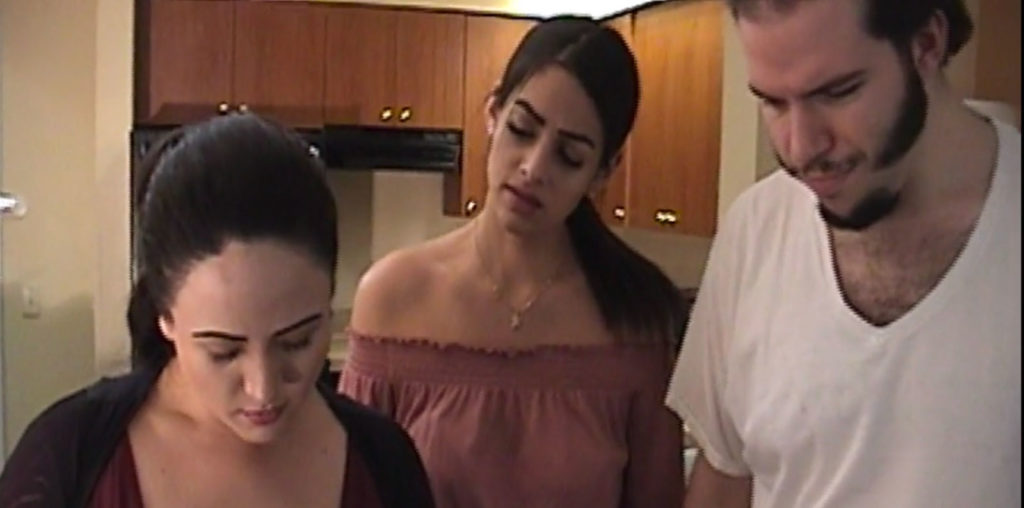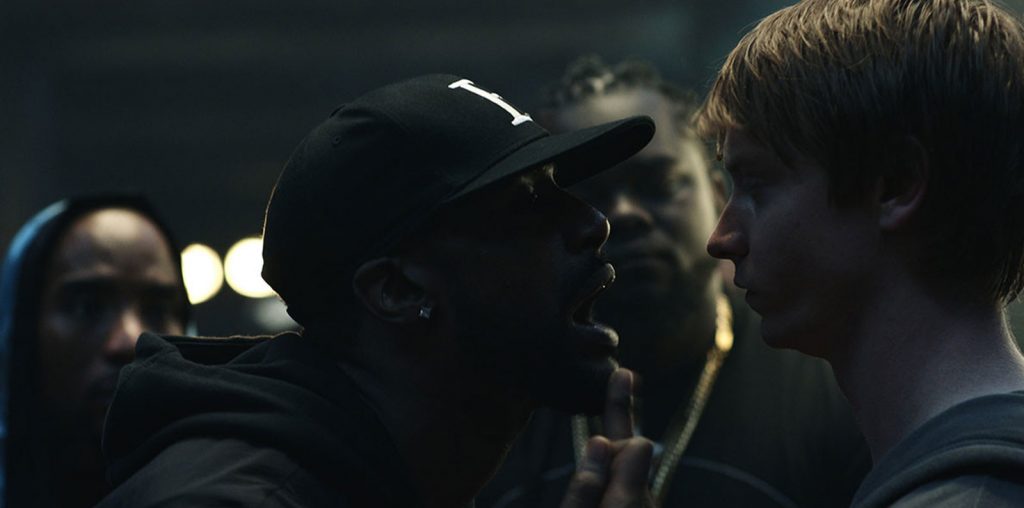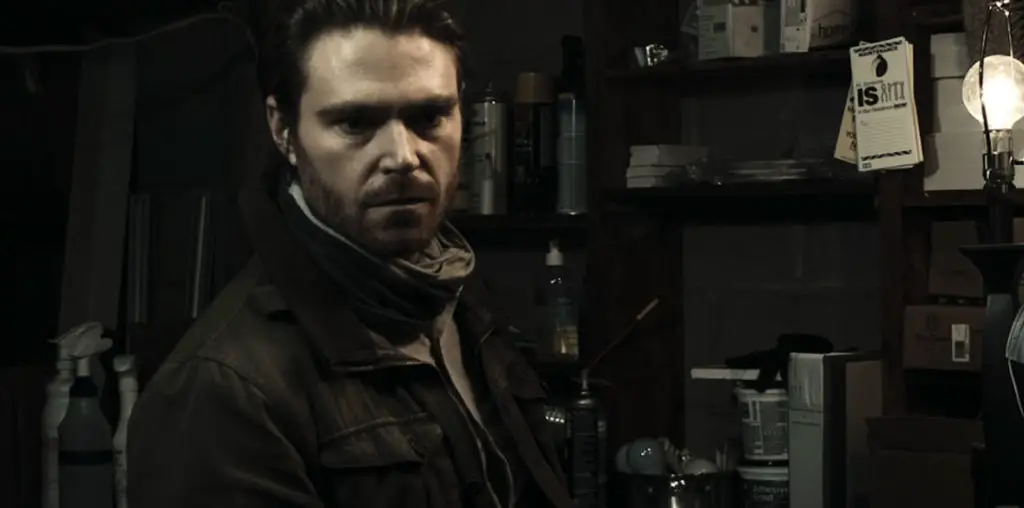
But you’ve got that Billy Wilder story in Waking Life. (An anecdote, recited by Steven Soderbergh, about Billy Wilder disparaging the market prospects of dream-within-a-dream films like Waking Life itself.) ^ Yeah, I think it’s kind of poignant in Waking Life for the film to sort of become aware of itself. Where there’s a film within it about its economic realities….
You think you’re gonna lose the 2 and a half million?
No, that’s the final irony probably. You know, that it’ll do okay.
There’s some deconstruction too, in Waking Life – the whole scene about making the music.
I like that. That’s why I put it in the beginning. I don’t think I’ve ever seen the orchestra warming up that’s gonna do the score to your movie. I thought that it would – you know violins would look cool, and the other instruments would look cool animated, but on another level I like the idea that it sort of lets us in on the process. That they’re rehearsing. It’s very important that you don’t see them playing the polished piece. I mean, it kind of sets up the whole movie cause I thought the whole movie is very much that – the process … by the end, they’re playing out publicly and they’re not stopping to work on the… it shows the whole progression, people dancing to it. So the process does end somewhere. In public recitation. And you can only think of them back in the rehearsal space working on another tune.
And there’s the stepping out moment with the sort of Bazin thing.
Yeah, I mean there’s a lot. One of the themes running through it is probably cinema, narrative or feature, you know, what story are you telling? The answer could be, your film needs to have its own story that way. You know, it’s like an evolving thing setting up aspirations for itself, what it is, what it isn’t, I’m trying to figure out what it is.
Is film theory very important for you?
Uh, I think it has been at other times in my life. Like when I was first starting out, I sort of read everything, and it’s interesting to consider, but how much you internalize and how much you sort of park away – it’s important.
In that particular scene, is that more from that actor or is that from you?
That scene happened very spontaneously from that actor. Caveh, he’s a Bay Area filmmaker, I read the thing about narrative film, in general know what he’s talking about. But we started rehearsing that, had all the imagery, I said, okay, hold it right there. Just tried to capture spontaneously, I figured. He had some business and structure, a lot of the other people weren’t actors, I don’t think they were kind of aware so much about film. It’s a very spontaneous moment, it’s ironic cause it’s the one you’re watching in a theatre, it’s the one actually performed spontaneously, so I’m kinda proud of that.
Was there anything you caught outside the scheduled shoot, where you just happened to have your camera and you thought, this has gotta go in the movie?
Uh… I’d say the Soderbergh quote is the closest I came to that. He was in town, we were hanging out. I just had the camera handy, we shot that. Yeah, but not much. You know, like everything was pretty much rehearsed, structured, we didn’t want it to feel that way, it’s reality. It’s a construct.
That whole Holy Moment concept, that’s a very theoretical thing you’ve stuck in the film in the voice of one of the characters. Where do you actually stand on that whole question?
On what level? On some level, because it’s in a movie that I put out, I mean I stand by it, I mean I like it, it fits in the movie, I like the thought process that everything might be sacred. There’s a lot of things in the movie that might not be technically true, it’s kind of beyond that level, it’s not true or false. It’s kind of like individual, interesting thoughts to kind of like include in your worldview or not. I mean that’s how we go through life for some people, you know, we’re just taking in everything going, yes no yes no. Something will resonate with you, you carry it with you and maybe give you something positive. We’re all very different. But I think obviously if I left it in the movie, it gave me some kind of something.
OPERATOR/PUBLICIST: We have about three minutes left.
(quoting from the film) So you may not like it, or you may not even agree with it, but you accept it.
(Laughs) Very good, you see what a multiple viewing can get you.
I also like, it’s kind of a flaky thing for me to like, but that whole fortune telling device the kids use?
Well that kind of sets off the whole fate, predestination, free will, that kind of sets that in motion. That’s one of the themes I think.
It just freaks me out that kids in North America have created this device which is like the equivalent of throwing the chicken bones.
Throwing the chicken bones?
You know, like throwing the chicken bones like Shamans would do, and somehow kids using paper and pens and numbers…
Well, that’s one of those things we all wanna know. We all wanna be in touch with the future – on a telepathic level. Chaotic chaos… That’s probably closer to my actual belief on a scientific level.
I dunno, Chaos, free will, I mean we only got three minutes, chaos versus free will or do you lucid dream, I dunno which question has a more interesting answer to you…
All the above, but yeah, I definitely lucid dream. I’m very interested in that experiential thing. I kind of think science, the brain, meets consciousness, it’s like I think of, you know, the Lucidity Institute up in Pittsburgh, they’re very … It’s science, it’s research, it’s academia, it’s not a bunch of people going, “Oh there’s another world,” go to great lengths to act like,.. You know, it creates a mature, realist experience that just doesn’t happen in the real world. I’m fine with things being unreal. I think I’ve always found things very unreal. Technically it’s not real and yet, that doesn’t mean it’s not real.
Do you have any cool lucid dreams that you’ve had recently?
I have ’em all the time. A lot of ’em are in the movie. Dave Levin has this great quote of me saying “I distinctly remember you saying, “I have to go to bed and work on this movie”. I gotta go to sleep – I got work to do. So yeah, every night… It’s a discipline, like anything else, anyone can do it. It doesn’t represent any kind of enlightenment or any kind of…
Hey, have you ever read the Unabomber manifesto, by the way?
You know, I glanced through some of it. I never read the whole thing. Is it good? From a to Z? I got kinda bored with it.
Well, it’s structured like Debord’s Society of the Spectacle in a way. But there’s a good part in it where he says that when things get really bad, we’re not going to have a revolution, we’re just going to start taking prozac. And start drugging ourselves to adapt.
I agree. That’s probably what we’re doing in North America. I think in other parts of the world, obviously, I think when things get bad, they get reactive. Radical. Maybe just even the thought of revolution, of political change… like you used to be able to channel that into something, that you had some hope of revolutionary tendency to develop in kind of an official way.
OPERATOR/PUBLICIST: Anyway, that’s all we have time for, gentlemen.
Alright, well, thanks a lot man.
We could talk about a lot of stuff for quite a while. It sucks, but that’s our limitations, you know.
Check out FILMTHREAT.com’s INTERVIEW ARCHIVES and read hundreds of fascinating in-depth interviews with directors, filmmakers, actors and celebrities from the world of film!


